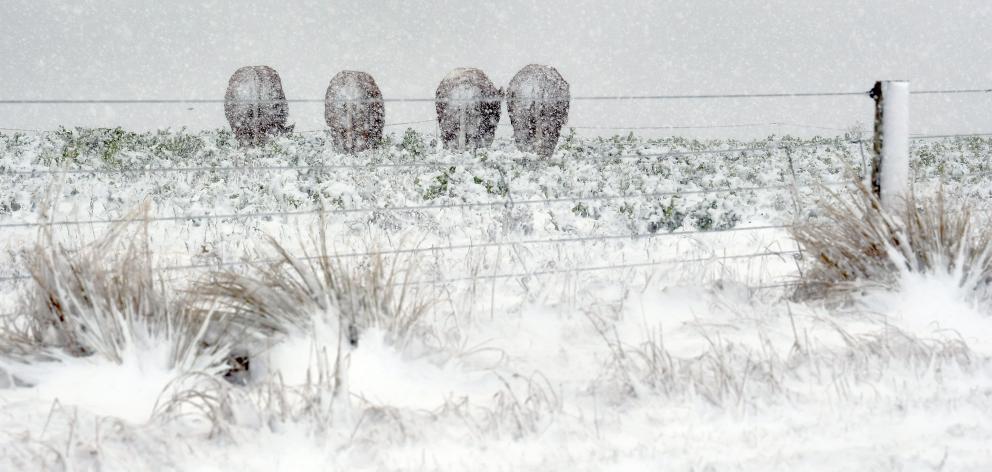MetService this morning updated its advisories to include a heavy snow warning for the peninsula, Arthur's Pass, Southland, Stewart Island, Clutha, Dunedin, Central Otago south of Alexandra, the Southern Lakes District south of Queenstown, and Fiordland from Te Anau southwards.
Banks Peninsula residents are warned to expect 10-20cm of snow above about 200m, with lesser amounts down to sea level, from 10pm today until 10am tomorrow.
MetService said snow in the area may disrupt travel in affected areas and could damage trees and powerlines. The cold conditions may cause stress for livestock.
A heavy snow watch was in place for Marlborough, south of the Clarence River, the Canterbury High Country and foothills, North Otago, Central Otago from Alexandra northwards, and the Southern Lakes District from Queenstown northwards.
Snow has already closed Arthur's Pass and Lindis Pass this morning, and it is expected there will be more road closures as the day goes on.
Meanwhile, Queenstown Lakes District Council says there have been flurries all over the district this morning. Snow was being cleared either side of the Crown Range and chains need to be carried.

There have been reports of snow settling all around inland Otago, and there has been a dusting on some hills around Dunedin.
MetService meteorologist Angus Hines earlier said a "bitterly cold polar outbreak" was expected to bring a return to wintry conditions today as cold air from the Antarctic moves up the South Island.
Snow is forecast to 200m throughout Otago and Southland and is expected to dip to sea level in the afternoon, Mr Hines said.
Flurries in central Dunedin are possible, with effective temperatures of about 2degC-3degC.
The cold weather is expected to continue into tomorrow, before turning mostly fine by Friday, although temperatures will remain low over the weekend.
Such an early-October cold snap was uncommon and there was potential for record low temperatures, Mr Hines said.
In Invercargill, today’s maximum temperature is forecast to be 6degC, while the lowest previous October temperature was 5.8degC, he said.
Road snow warnings are in place on Dunedin’s Northern Motorway (State Highway1), Milford Rd ( SH94), Crown Range Rd and in the South Island’s alpine passes.
 Cromwell fruitgrower Simon Webb said dealing with the cold snap was different from the inversion frosts which often affected orchards.
Cromwell fruitgrower Simon Webb said dealing with the cold snap was different from the inversion frosts which often affected orchards.
Because it was cold air, frost-fighting wind machines would not work as well as systems which worked by sprinkling water over fruit, which most orchardists did not have.
For those orchardists, "if it’s blowing and it goes below zero, there’s nothing you can do," Mr Webb said.
The worst-case scenario for affected areas was that vulnerable fruit could be killed off and orchardists would have to wait another 15 months for the next crop, Mr Webb said.
Central Otago high country farmer Andrew Paterson said he had been getting recently shorn stock into sheltered paddocks, along with ewes and lambs that were being shepherded.
Other high country stock would have to find their own shelter, as it would do more damage moving them once they had started lambing, Mr Paterson said.
Southern district road policing manager Inspector James Ure urged people to drive to the conditions by increasing following distances and allowing extra time.
Waka Kotahi NZ Transport Agency journey manager Tresca Forrester said drivers should monitor weather forecasts and pack warm clothes and food if they were travelling.
Extra care was also needed for driving high-sided vehicles or campervans due to expected high winds, Ms Forrester said.
An NZ Post spokesman said any voting papers received by councils by noon on Saturday would be deemed to be eligible.
Any ballots not delivered to councils or the two election counting organisations, Election Services and Electionz.com, due to weather would be invalid.
If a council required extra time due to weather, the electoral organisations could decide to make an application to extend the voting period, he said.













